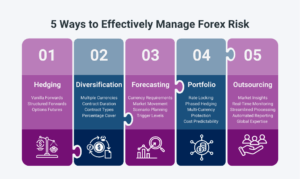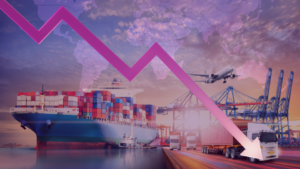Podcast
Sustainable Supply Chains - Building Financial, Operational & Technological Resilience
In this episode, our CEO, Sharon Constançon, is joined by guest speakers Bruce Trebble and Linda Reddy to explore the multi-layered challenges facing exporters in today’s volatile global trade environment.
From foreign exchange management and treasury planning to logistics coordination and digital trade solutions, the panel explores how businesses can enhance their supply chains in the face of disruptions and complexity.
Whether you’re navigating operational bottlenecks, currency volatility, or considering how digitisation can improve your export process, this session offers practical insights to help you build more resilient, adaptable, and future-proof supply chain strategies.
Key Takeaways
Building resilient supply chains requires more than simply navigating logistics or financial transactions. This podcast explores how exporters can strengthen their global operations by aligning financial management, logistics execution, and digital transformation.
Key takeaways include:
- Supply chains remain highly vulnerable to disruption
COVID-19, geopolitical conflicts, and shifting trade routes have created lasting volatility in global sourcing and logistics. - Near-sourcing and multi-route flexibility are increasing
Exporters are moving toward local or regional sourcing to reduce dependency on long-haul shipping and avoid bottlenecks. - Currency volatility directly impacts profitability
Foreign exchange risk is present throughout the whole supply chain process, not just at the point of payment. - Proactive treasury management protects margins
Exporters who manage foreign exchange (FX) risk strategically can avoid unexpected costs, protect their competitiveness, and capture savings of 2–10%. - Digitising trade documentation cuts costs and time
Digital platforms can reduce document processing costs by up to 90%, simplify compliance, and accelerate cross-border trade. - Technology adoption is limited by complexity, but accelerating
Digital systems exist, but many supply chain partners still rely on outdated, paper-heavy processes. Exporters must challenge service providers to modernise. - Trusted data must underpin any digital or AI solution
Without clean, validated data, AI systems create risk. A robust data foundation is crucial for secure and scalable digital supply chain management. - Adaptable leadership is now essential in supply chains
Modern supply chain teams need not only expertise but also high adaptability, strong stakeholder management, and the ability to navigate constant change.
Overview
The Global Disruption Reality
- Supply chains remain under strain from COVID-19, geopolitical conflicts (Ukraine, Israel-Palestine), trade wars, and ongoing shipping challenges.
- Traditional trade routes have shifted dramatically, leading to longer lead times, greater stockpiling, and increased working capital pressure.
- Many countries are prioritising local manufacturing and near-shoring to reduce dependency on volatile shipping routes.
The Financial Risk Perspective (Sharon Constançon)
- FX risk exists throughout the full order-to-cash cycle: from purchase orders, shipping, invoicing, payment terms, through to settlement.
- Treasury management must proactively monitor and hedge exposure across multiple stages, not just at invoicing.
- Businesses that structure FX strategies correctly often achieve cost savings of 2–10% — improving competitiveness and profitability.
- Exporters must take ownership of their own FX risks rather than allowing market volatility to dictate financial outcomes.
The Operational Logistics View (Linda Reddy)
- Daily disruptions require constant contingency planning and real-time adaptability.
- Distributors are holding higher stock levels to cope with unpredictable shipping schedules, increasing working capital requirements.
- Supply chain leadership has shifted: adaptability, social intelligence, and problem-solving are now core skills in managing global complexity.
- Companies are prioritising leadership teams capable of navigating multi-route, multi-market challenges.
The Technology & Digitisation Perspective (Bruce Trebble)
- Digitising trade processes offers significant cost savings and faster trade execution.
- Electronic trade documentation reduces costs from £50–500 per shipment to £20 or less.
- The UK’s Electronic Trade Documents Act (EDTA) is creating global legal frameworks for secure digital ownership of trade documents.
- Trusted data infrastructure is critical to safely integrate digital trade platforms and future AI applications.
- SMEs can gain advantage by adopting digital trade systems faster than large incumbents who are still reliant on complex, manual systems.
Final Takeaways
- Total cost of ownership is becoming the dominant supply chain management metric.
- Complexity creates opportunity: SMEs that adopt digital platforms can compete faster and more flexibly.
- Effective FX risk management helps exporters protect margin and growth.
- Future supply chains will be built on trusted data, digital platforms, and highly adaptive leadership.
Featured Article
Efficient supply chains aren’t built on logistics alone. True resilience comes from integrating financial risk management, coordinated inventory planning, and operational agility across every stage of global trade.
Discover how importers and exporters can build sustainable supply chains by integrating treasury, logistics, and digital trade solutions to strengthen global resilience.
Host
Sharon Constançon is a highly accomplished CEO and renowned specialist in forex risk management and treasury strategy. With over 25 years of experience advising international companies, she brings sharp insights into how financial planning intersects with operational resilience. Sharon leads Valufin, a firm delivering tailored treasury and risk solutions to help companies navigate currency volatility and global uncertainty with confidence.
She has supported over 200 businesses with risk evaluations, transaction cost analysis, and FX treasury strategies. Sharon is also an experienced board advisor and educator, often speaking on governance, finance, and strategic resilience in fast-moving markets.
Guest Speakers
Bruce Trebble is a seasoned expert in global trade, import-export management, and supply chain digitisation, with extensive experience in optimising the movement of goods across international markets. As the CEO of Trebble Trading Limited, he oversees global commodity trading, supply chain certification, and digital transformation initiatives, helping businesses enhance efficiency, transparency, and commercial value in international trade.
Bruce specialises in identifying commodity sources, connecting buyers with producers, and ensuring seamless cross-border trade operations. His work focuses on leveraging cutting-edge digitisation and certification technologies to drive efficiency, reduce costs, and increase visibility across supply chains. Through the latest e-commerce and trade automation platforms, he helps companies streamline operations and improve regulatory compliance in an increasingly complex global trade environment.
Linda Reddy is a globally recognised supply chain leader and transformation specialist, with 30 years in corporate and 24 years leading high-impact teams across FMCG, banking, and hospitality. Currently serving as Global Supply Chain Executive at Nando’s Group Limited, Linda oversees operations that span 16 countries, 165 products, and more than 11 million litres of sauce produced annually — all while supporting 800 smallholder farmers and driving significant P&L growth.
From managing farm-to-fork logistics and manufacturing scale-ups to developing future leaders and empowering women in business, Linda brings a deeply people-centred and operationally grounded perspective to global trade. Her ability to build inclusive, high-performing teams across complex geographies earned her the Supply Chain Executive of the Year Award 2023.
Linda’s impact extends beyond the boardroom — she is a social impact advocate, global advisor, and community builder, with active leadership roles in international networks such as the Harvard Business School Women’s Association and the Women Food & Agriculture Association.
At this webinar, Linda will share her insights on transformation leadership and how people-driven strategies play a vital role in building resilient and sustainable global supply chains.
Discover how Valufin’s expertise can support your business
Contact your forex treasury advisor today.

















